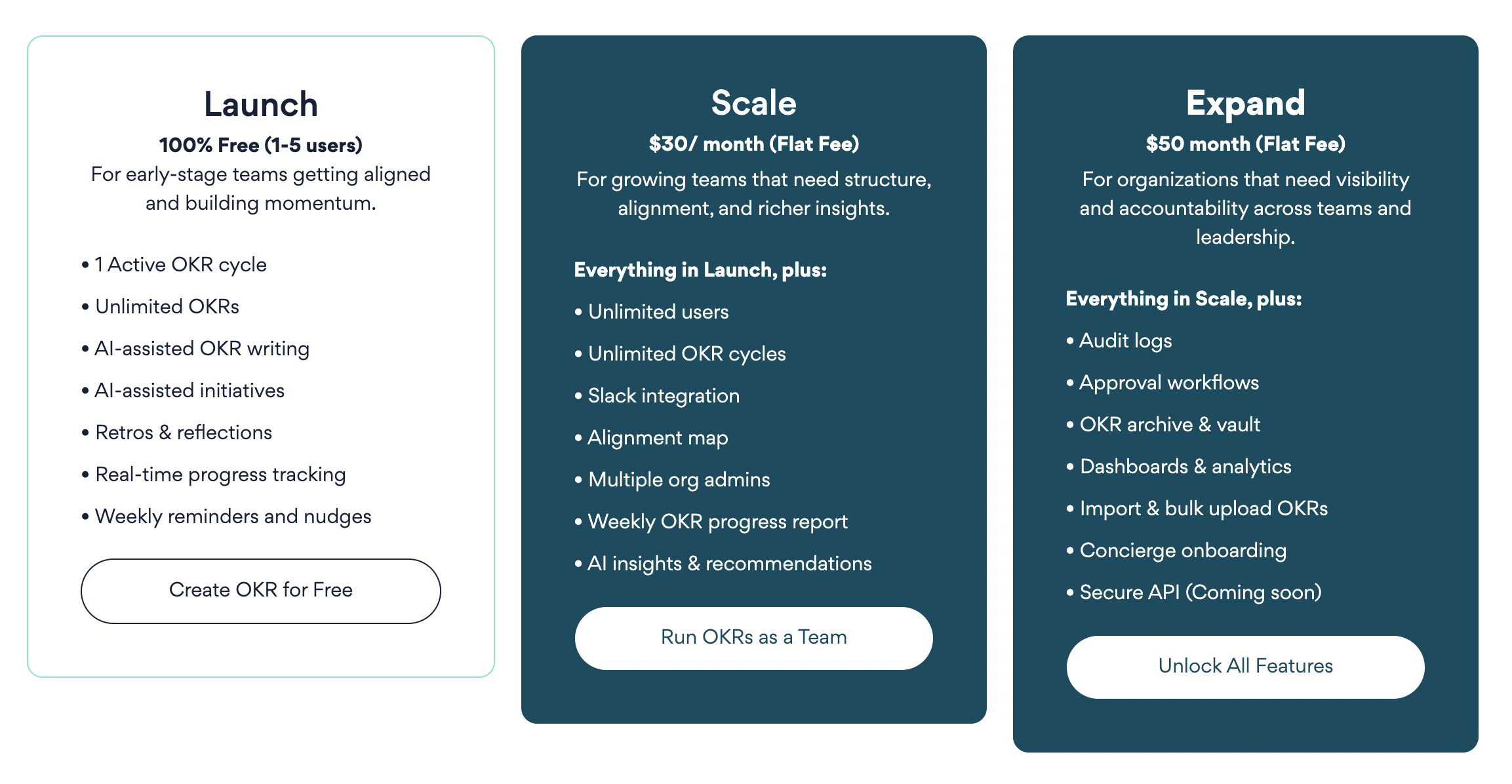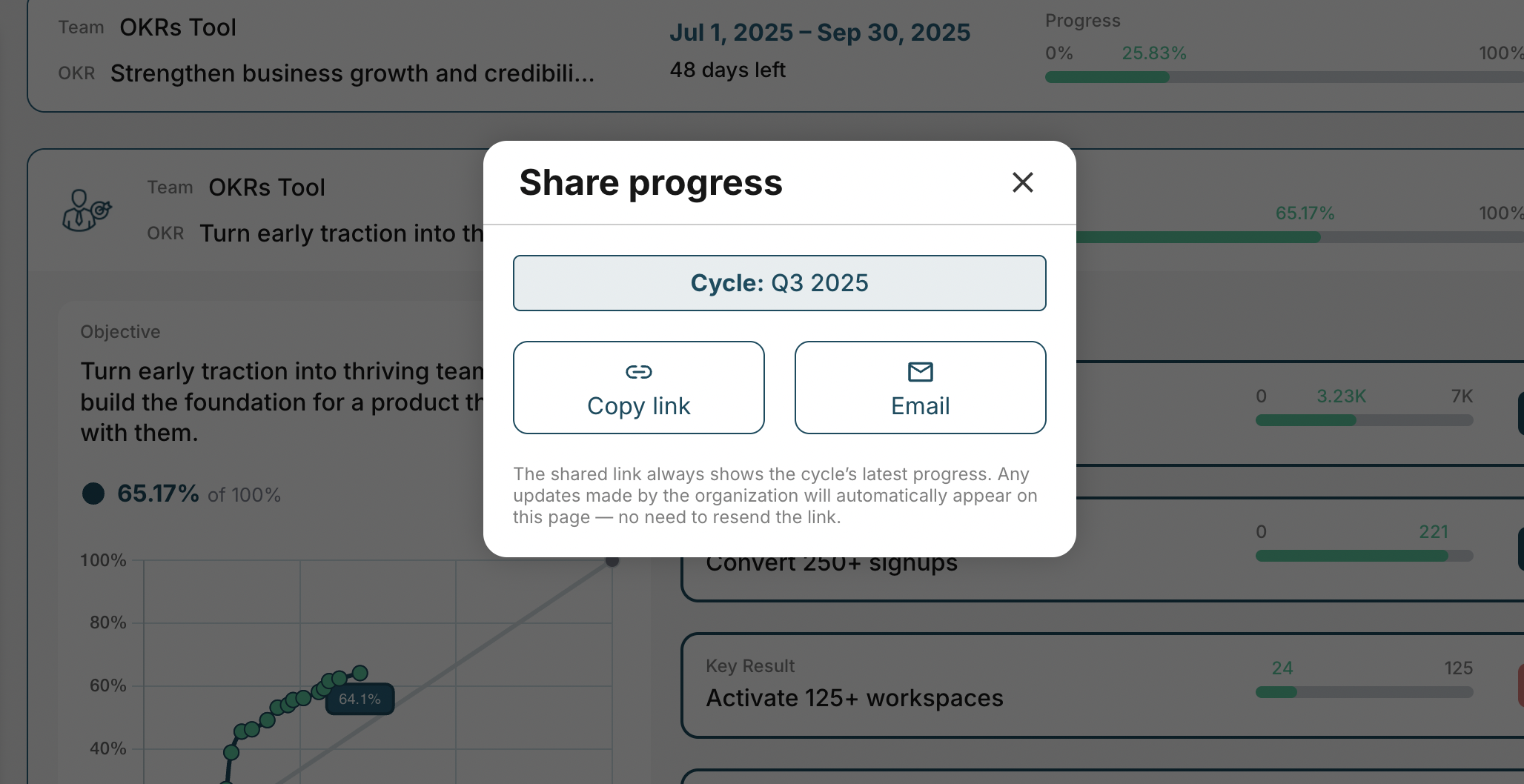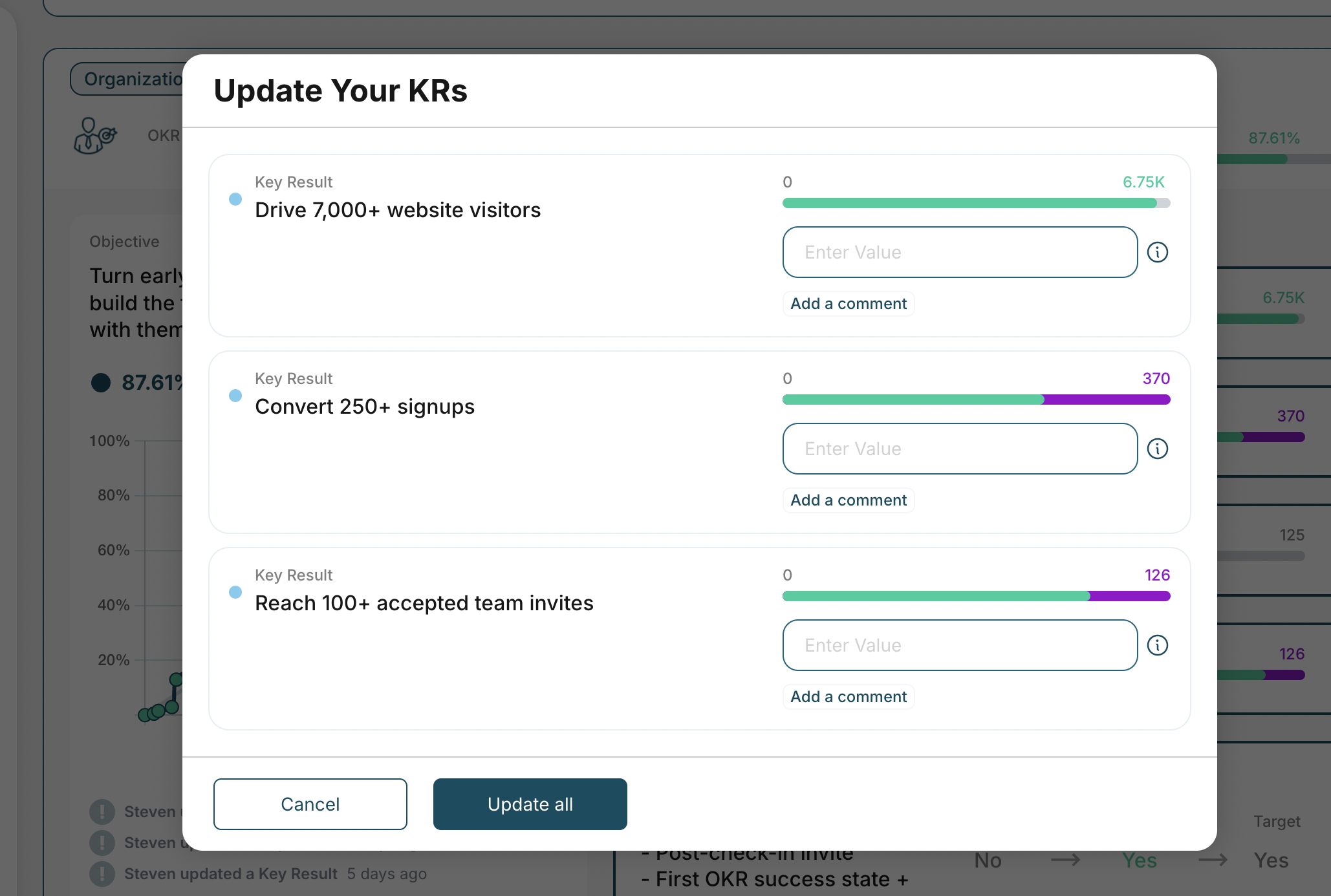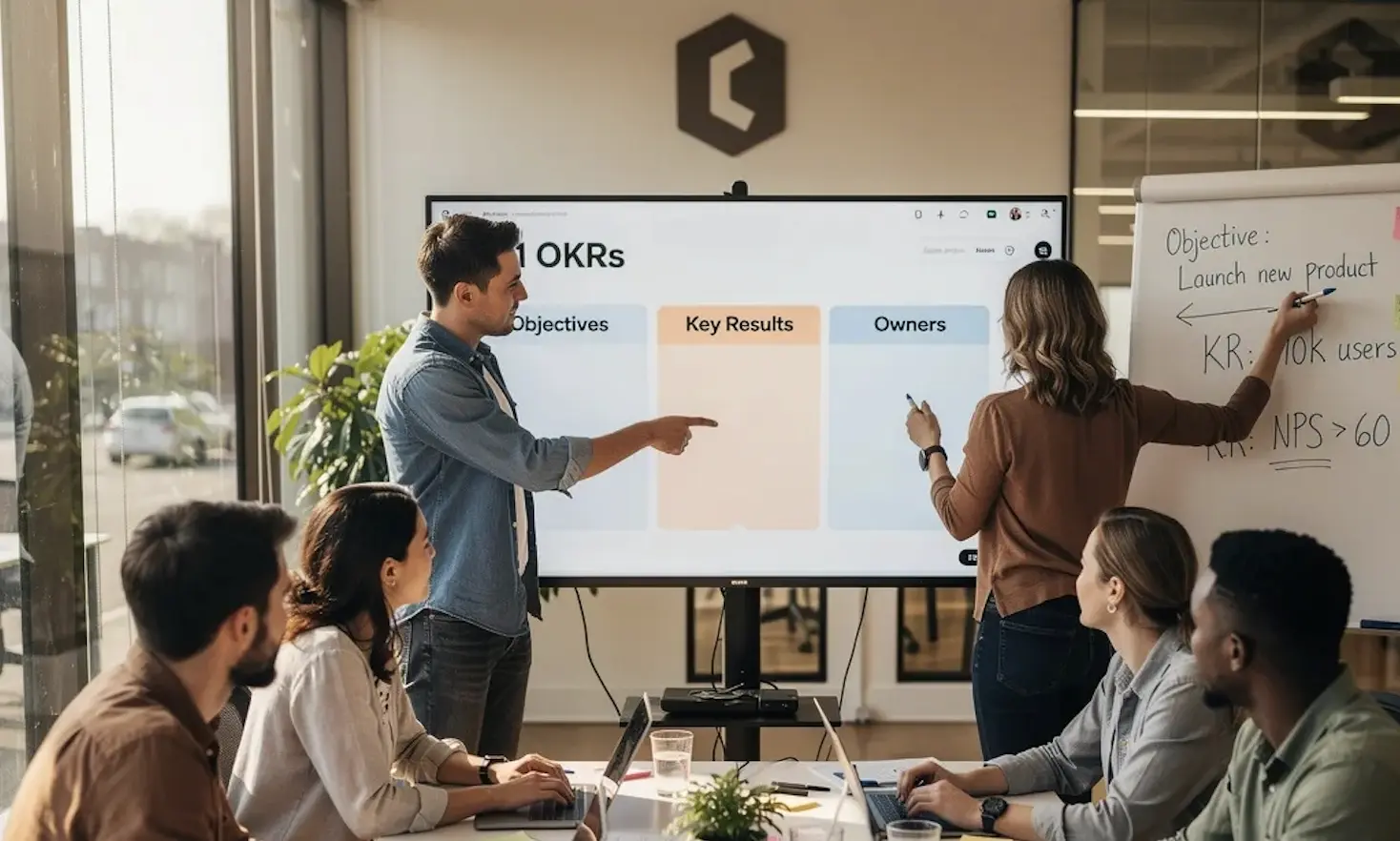OKRs (Objectives and Key Results) have gone mainstream - but picking the right software to run them is another story. At first glance, every tool looks the same: dashboards, check-ins, and alignment charts.
But once you start using them, the differences are stark.
Some platforms are heavy, enterprise-first systems. Others bolt OKRs onto culture or HR software. And a few - like OKRs Tool - are designed for startups and remote-first teams who want something lightweight, affordable, and habit-forming.
I built OKRs Tool because I kept seeing the same problems: OKRs set in spreadsheets, enthusiasm fading after a few weeks, and per-seat billing that made it impossible to get the whole team involved.
But how does it actually stack up against three of the most common alternatives - Tability, Weekdone, and Perdoo? Here’s the breakdown.
Before We Dive Into Features…
Choosing OKR software isn’t easy. On the surface, most platforms look identical - every demo shows workflows, progress updates, and integrations. But when founders actually roll them out, cracks appear fast:
- Costs balloon with per-user pricing.
- Adoption stalls because setup feels heavy.
- OKRs quietly die in spreadsheets because the tool doesn’t fit the team’s rhythm.
That’s why it pays to look past the feature checklist and focus on how each tool really works day-to-day.
1. Pricing: Flat vs. Per-Seat
Most OKR platforms bill per user. That sounds fine at first, but once your team grows, so do your costs - and worse, it discourages founders from inviting everyone into the system.
- OKRs Tool: Flat pricing. Free for up to 5 users, then $30/month flat.
- Tability, Weekdone, Perdoo: All use per-seat billing after their free tier.
Flat pricing means your 12-person remote team can all join without budget fights or deciding who “deserves a seat.”
Takeaway: If you want everyone engaged without cost creep, OKRs Tool’s model is the most startup-friendly.

2. Setup Speed: Seconds vs. Consultants
Your first OKR cycle shouldn’t take weeks to set up. Yet many OKR tools add friction with complex onboarding or reliance on consultants.
- OKRs Tool: Create your first OKR in seconds - no training required.
- Tability: Wizards and kanban boards help, but add steps.
- Weekdone: Strong templates, but can feel heavy for small teams.
- Perdoo: Built for enterprises, often overwhelming for early-stage startups.
With OKRs Tool, a founder can literally create the first cycle during an all-hands, live, without training. Try that with enterprise-first tools.
Takeaway: If you need to move fast, OKRs Tool cuts the learning curve.
3. AI: Drafting vs. Insights
AI is the new battleground in OKR software - but not all AI is equal.
- OKRs Tool: Drafts OKRs and initiatives, analyzes engagement, flags risks, and even suggests resource allocation.
- Tability: AI-driven retrospectives and dashboard generation.
- Weekdone & Perdoo: Dashboards and reporting, but no clear AI-driven features.
Dashboards tell you what happened. AI insights tell you what to do next. That’s where OKRs Tool shifts from passive reporting to active coaching.
Takeaway: Only OKRs Tool turns AI into a practical coach that reduces admin and keeps teams on track.
4. Sharing and Visibility
OKRs only work if they’re visible - to the team, and often to external stakeholders like advisors or investors.
- OKRs Tool: Secure, shareable public links (view-only, no login required).
- Tability: Supports public views.
- Weekdone & Perdoo: Private by default, logins required.
If you need to show your board quarterly OKRs, OKRs Tool makes it a one-click share, not a messy export.
Takeaway: If you work with external stakeholders, OKRs Tool and Tability make life easier.

5. Engagement and Insights
OKRs aren’t about writing goals - they’re about building habits. That’s where engagement insights matter.
- OKRs Tool: Tracks check-in frequency, highlights teams at risk of drifting, and surfaces engagement data alongside goals.
- Tability: Retrospectives and dashboards.
- Weekdone: Adds cultural features like feedback and recognition.
- Perdoo: Focuses on reflections and risk reporting.
With OKRs Tool, a team lead can see which groups haven’t checked in for two weeks - before the quarter slips away.
Takeaway: OKRs Tool makes engagement measurable, not just assumed.
3 Differentiators That Make OKRs Tool Stand Out
While plenty of OKR software tools cover the basics, a few design choices make a huge difference in whether teams actually stick with them. This is where OKRs Tool pulls away from the pack - with three differentiators you won’t typically find elsewhere.
1. Vault for Cycles (With Reopen Capability)
Most tools let you archive or clone old cycles, but once they’re closed, they’re frozen.
OKRs Tool’s Vault gives you searchable, read-only past cycles - and lets you reopen them if needed. That flexibility keeps history useful instead of locked away.
When a Q2 goal gets delayed into Q3, you can just reopen the cycle instead of copy-pasting half-done work.
2. AI Insights Beyond Dashboards
Dashboards tell you what happened. OKRs Tool’s AI goes further: surfacing risks, suggesting resource allocation shifts, and prompting reflection before issues snowball. It’s proactive, not passive.
3. Smarter Check-Ins and Batch Updates
Check-ins shouldn’t feel like busywork. With OKRs Tool, you can update multiple KRs at once, choose between progress-only, comment-only, or full override modes, and even adjust status manually.
That flexibility means a manager can review 6–8 KRs in five minutes before standup instead of burning a whole meeting.

At a Glance: OKRs Tool vs. Tability vs. Weekdone vs. Perdoo
If you’re skimming, here’s the quick view. While many of the basics overlap - OKR creation, hierarchies, progress tracking - some of the differences are stark. This table shows where OKRs Tool pulls ahead, especially on pricing, AI, and usability.
That last row says it all: for a 12-person team, OKRs Tool costs a flat $30/month - while Tability, Weekdone, and Perdoo all run 4–5x higher. Same use case, radically different price curve.
Final Thoughts
Choosing OKR software isn’t about chasing features - it’s about finding a tool your team will actually use quarter after quarter.
Tability, Weekdone, and Perdoo are strong in their own ways: Tability for retrospectives, Weekdone for cultural add-ons, Perdoo for enterprise strategy.
But for startups and remote-first teams, the priorities are different: predictable pricing, instant setup, and small design choices that make OKRs stick.
That’s where OKRs Tool is unique. From the Vault that keeps past cycles useful, to AI insights that do more than decorate dashboards, to smarter check-ins that save time instead of wasting it - OKRs Tool is built to keep OKRs alive, not just written down.
If you’ve tried spreadsheets, dabbled in heavy tools, and still can’t get OKRs to stick - try something built for you. Run your next cycle in OKRs Tool and see if your team stays engaged past week three. That’s the real test.






